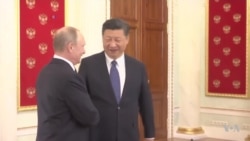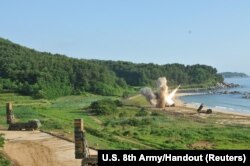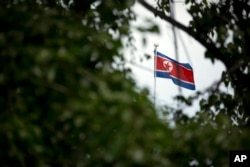North Korean leader Kim Jong Un is boasting over his country's first successful test of what appeared to be an intercontinental ballistic missile (ICBM) on Tuesday.
Kim told a group of scientists and technicians that the United States would be "displeased" to receive what he called "a package of gifts" as it celebrated its annual Independence Day holiday, according to the regime's Korean Central News Agency.
North Korea launched a missile dubbed the Hwasong-14 Tuesday from an airport near its border with China. The North's Academy of Defense Science says the Hwasong-14 traveled 933 kilometers and reached an altitude of 2,802 kilometers. The missile splashed down in the Sea of Japan after a 39 minutes in flight.
Based on analysis of the steeply angled trajectory the rocket followed, U.S. experts said the missile appears to have a range that would enable it to reach Alaska.
KCNA says Kim Jong Un, wearing "a broad smile on his face," urged his scientists to "frequently send big and small 'gift packages' to the Yankees."
U.S. Secretary of State Rex Tillerson issued a statement confirming the North's missile test, which he says "represents a new escalation of the threat to the United States, our allies and partners, and the world."
Tillerson says global action is needed to stop the threat posed by Pyongyang. He said any nation that hosts North Korean guest workers, provides the North with economic or military benefits, or fails to carry out U.N. resolutions against Pyongyang "is aiding and abetting a dangerous regime."
Emergency session
Dana White, the Pentagon's chief spokesman, issued a statement saying Tuesday's missile test "continues to demonstrate that North Korea poses a threat to the United States and our allies."
A spokesperson for United Nations Secretary-General Antonio Guterres issued a statement condemning Pyongyang, saying its missile test is "yet another brazen violation of Security Council resolutions and constitutes a dangerous escalation of the situation."
The U.N. Security Council has set an emergency, closed-door meeting on the North Korean crisis for late Wednesday, and Tillerson said there would be stronger measures against the North.
In South Korea, U.S. and South Korean forces said they carried out an offensive missile exercise hours after the North Korean launch, intended to counter "North Korea's destabilizing and unlawful actions."
"The U.S. commitment to the defense of the ROK (Republic of Korea) in the face of threats is ironclad," a joint statement said.
The spot in the Sea of Japan where the Hwasong-14 splashed down lay in Japan's special economic zone, angering not only Tokyo, but also China, which appears to be failing to keep its ally in check.
China urges restraint
Chinese Foreign Ministry spokesman Geng Shuang said Beijing has made “relentless efforts” to resolve challenges on the Korean peninsula. He said China’s role is “indispensable,” and called on all parties to exercise restraint to quickly ease tensions.
“[China] urges North Korea to refrain from acts that violate U.N. Security Council resolutions and instead create necessary conditions for resuming dialogue and negotiations,” Geng said.
President Donald Trump will likely pressure China even harder to harness the North's nuclear ambitions. Trump has said while he “greatly appreciated” the efforts of China's President Xi Jinping to help rein in North Korea, “It has not worked out. At least I know China tried!”
“Perhaps China will put a heavy move on North Korea and end this nonsense once and for all!” Trump tweeted Tuesday.
Cheng Xiaohe, a political science professor at Beijing's Renmin University, said it is still too early to tell what steps China might be willing to take, or how the United Nations will respond, whether merely condemning the launch or enacting a new round of sanctions.
“If new sanctions are enacted it should include new measures, such as a ban on North Korea-bound tourism, the export of labor and bans on North Korean petrochemical products,” Cheng said. “All of these are possible measures the Security Council could discuss.”
China has expressed a reluctance to cut off such vital exports to the North, such as oil, since it is feared that could lead to the collapse of Kim's regime, with untold consequences, or that Kim, believing he has nothing lose, could take direct military action against Seoul.












